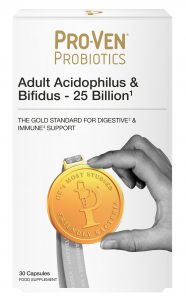What role does our immune system play and why is it so important for our health? Nutritionist, Adrienne Benjamin, explains.
Our immune system is a huge, dynamic network of cells, tissues and organs that work together to defend the body against harmful substances. It is extremely complex and can recognise and remember millions of different attackers and produce cells and other compounds to kill specific germs.
One of the key elements of a healthy immune system is the ability to distinguish between the body’s own cells (‘self’) and foreign cells (‘non-self’) and to attack organisms marked as ‘non-self’ and not those that are part of us.
Our immune system is constantly under attack by a wide range of factors, including genetics, infection, stress, a diet high in sugar and alcohol, lack of sleep, smoking, lack of exercise and poor hygiene, but as long as it is working properly, we won’t even notice it. If it fails for any reason however, we will become unwell.
The gut and immunity
With its selective barrier, thick mucous layer and large numbers of immune cells, our gastrointestinal tract (GIT) and gut microbiota are closely involved in the body’s immune function – around 80 per cent of our immune system resides in our gut.
Our GIT is the main site of interaction between our immune system and both beneficial and pathogenic microorganisms and the development and function of the immune system depend on these interactions. The GIT is a dynamic structure that recognises commensal (‘self’) bacteria and helps to regulate the particles that pass through our intestinal lining into our bloodstream and body.
A healthy digestive tract will allow miniscule particles of digested food and nutrients to pass through the gut wall and will keep out larger food particles and pathogens. If the gut wall is damaged, these large food particles and pathogens can enter the blood, where they are treated as foreign invaders by the body, which produces an immune reaction that causes inflammation and pain and can lead to inflammatory conditions, such as arthritis, acne or eczema.
The gut microbiota is established at birth, when bacteria are transmitted from mother to baby and during the first year of life as the baby is exposed to different external factors. The diversity and number of bacteria in the microbiota increases over this period to support the development of the immune system and ensure that the bacteria are recognised by the immune system as ‘self’.
A child’s microbiome and immune function is both generally established by the time they are three years old, although the gut microbiome will continue to refine the immune system throughout our life based upon what we put into our bodies.
Gut healthy diet
The key to supporting immunity is to ensure that our digestive system is functioning optimally, from our mouth to our anus, so that we are both digesting and absorbing all the nutrients from our food.
Eating the right foods in the right way can help to support our digestive system and this starts even before we eat with what is known as the ‘cephalic phase’, where the smell and anticipation of our food initiates saliva production and primes our digestive system for what we are about to eat.
Sitting down to eat and chewing our food properly is key and it is important to note that smoking and alcohol consumption can disrupt many of the processes involved with digestion, including the production of stomach acid and digestive enzymes and the numbers and diversity of bacteria in our microbiome.
When thinking about gut health, it is beneficial to base our diet around the following foods:
- Vegetables of all colours and varieties help to provide fibre to support motility, stool bulk and consistency, and to feed our gut microbiome. They also provide key nutrients, such as minerals from the soil, which are required for our gut function. Similarly, fruits contain fibre and vitamins to support gut health and integrity – including a wide variety of different fruits and vegetables in our diet each week helps to support optimum health.
- Prebiotics are fibres that are indigestible to humans but provide ‘food’ for the friendly bacteria in our guts. They are found in a wide variety of foods, such as vegetables (particularly onions, leeks and garlic) and legumes.
- Fermented foods are naturally rich in friendly bacteria and including foods like sauerkraut, live yoghurts, pickled vegetables and kombucha drinks in your daily diet can also help to top up ‘good’ bacteria and to maintain diversity.
- Foods containing essential fatty acids that our bodies cannot make for themselves, including oily fish, such as salmon, mackerel and sardines, and seeds, such as chia, flax and pumpkin.
- Good quality protein is also important as this is needed for cell production to ensure the integrity of the gut wall, where cell turnover is high. These protein foods include fish, poultry, eggs, nuts, seeds, beans, legumes and vegetables.
It is also important to remove foods that are detrimental to gut health, including processed foods such as cakes, biscuits, sweets and chocolate and any foods containing high levels of sugar, which feed the pathogenic species of bacteria and can lead to digestive symptoms such as gas and bloating.
Lifestyle change
As well as diet, general lifestyle factors also impact our gut health. These factors include stress, lack of sleep, medications (particularly antibiotics), infections, lack of or too much exercise and exposure to electromagnetic frequencies (EMFs).
Stress, in particular, has a significant effect on our digestive system as it involves a biochemical reaction that initiates a ‘fight or flight’ reaction so that we either run away from the stressor or fight it. To enable us to run or fight to the best of our ability, any non-essential bodily systems are downgraded until the stress is over – this includes both our digestive system and our immune system.
In today’s society, where stress is often both long-term and psychological or emotional, there is no off switch and this can lead to ongoing problems with both our digestion and immunity.
Lack of sleep also contributes to stress and has been shown to lead to an increased appetite, which may affect our digestion and the foods we choose.
Certain medications have been shown to impact both the gut wall and the gut bacteria themselves. Antibiotics work to kill bacteria and often do not discriminate between the ‘bad’ bacteria they are targeting and our own commensal bacteria. This can lead to an imbalance in our gut bacteria, which may not return to normal following the antibiotics and can lead to lowered gut and immune function.
Similarly, infections and EMFs may influence the gut, either directly or indirectly through additional stress on our body and both too much or too little exercise may also have a detrimental effect.
And there is one action that can help to reduce stress, thereby helping to improve mood, gut health and immunity – that is, spending time outdoors in nature (and even more so if we incorporate exercise and don’t worry about getting dirty).
Gut-friendly support
A diet high in plant foods is key to keeping our gut healthy, but it is important to understand that there are many nutrients and chemicals required for optimal digestion and absorption.
Two key supplements to be aware of are digestive enzymes and betaine HCl (stomach acid), which can be particularly useful as we get older and our levels of stomach acid decrease, which then impacts our ability to produce digestive enzymes (including lipases for fat digestion, amylases for carbohydrates and proteases for protein).
A good multivitamin and mineral complex might also be beneficial, as these nutrients are used in many pathways both in the gut and throughout the body and minerals in particular are lower in our foods today, due to depletion of these nutrients in the soil. Key minerals for gut health include zinc, selenium, magnesium and manganese.
And the importance of the microbiome in gut and immune health means that, as well as eating fermented foods, taking a probiotic supplement can help to support the levels of friendly bacteria and to maintain gut bacterial balance.
Focus on probiotics
As described previously, our gut bacteria play a key role in supporting our health in general and our digestive and immune health, in particular. They produce B vitamins and vitamin K in our body and help in the production of key hormones and neurotransmitters. In relation to immunity specifically, they form part of the protective barrier at our gut wall to help prevent toxins from entering our bloodstream and also provide signals to our immune system.
Probiotics are known as ‘proxies’ for the friendly bacteria in our gut. They often include strains of bacteria that are naturally present in our digestive system provided in high numbers in supplement form – generally between five and 50bn. They are designed to boost the numbers of friendly bacteria in our gut and to ‘crowd out’ the pathogenic types of bacteria to help prevent them from growing and causing an imbalance in our gut, known as dysbiosis.
If we are already experiencing gut symptoms, such as gas, bloating, constipation or diarrhoea, it may indicate that we are suffering from dysbiosis and adding in a high strength friendly bacteria supplement may help to restore balance.
There are a number of things to look for when selecting a good quality probiotic supplement. They include the following:
- Clearly defined strain numbers – every reputable strain will be given a unique number.
- Guaranteed bacteria count to the expiry date of the product (and not at the date of manufacture).
- Research supporting the individual product and the bacterial strains it contains.
- Evidence that the bacteria survive both stomach and bile acids and reach the intestines where they can be utilised.
- Survival at room temperature – this capability is now well-established and most commercial products should ensure survival of their bacteria at ambient temperatures.
- Bacterial strains that are found naturally in the human gastrointestinal tract.
- Evidence of safety both via research and positive independent customer reviews.
- Manufactured to current good manufacturing practice (cGMP) guidelines.

About the expert
Adrienne Benjamin is a Nutritionist at ProVen Probiotics and is committed to understanding (and sharing) the ways in which the gut and the microbiome support health.

Reader offer
Natural Lifestyle is offering readers the chance of winning one of three packs of ProVen Probiotics Adult Acidophilus & Bifidus – 25 Billion, each containing three packs. With 12.5bn clinically researched Lab4 friendly bacteria per capsule, alongside vitamins C and D, zinc, selenium and calcium, ProVen Adult Acidophilus & Bifidus – 25 Billion provides comprehensive daily support for both digestion and immunity. Supported by more than 20 clinical trials, the Lab4 live bacteria is the most comprehensively studied group of friendly bacteria in the UK. Click here to enter.

